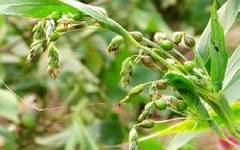
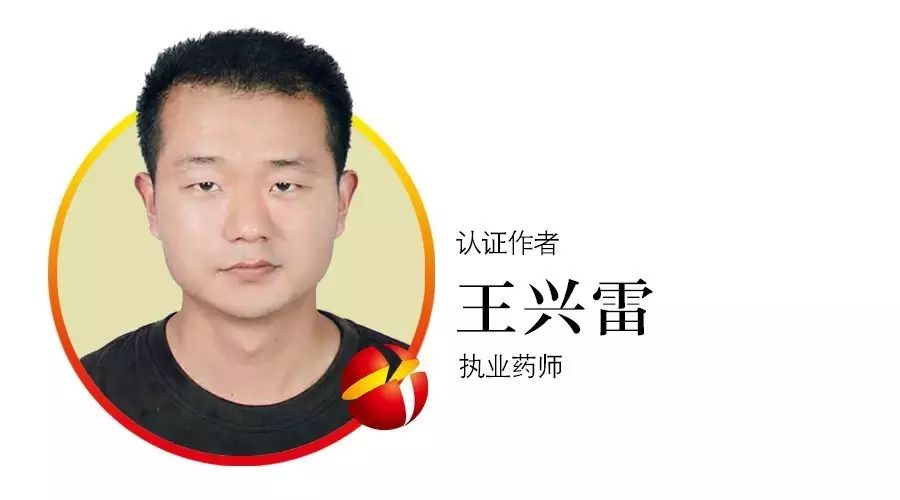
During the Eastern Han Dynasty, a rebellion occurred in the southern region of Jiaozhi. Emperor Guangwu of Han dispatched General Ma Yuan to suppress it. When the army reached Xuwen, the area was dense with mountains and forests, and miasma was rampant. The weather was extremely hot during the day and very cold at night, causing many soldiers to fall ill due to the damp heat, rendering them unable to fight. The general ordered the troops to camp and rest. One night, Ma Yuan was troubled in his tent when suddenly an elder entered, holding a stalk of Job’s Tears (Yìyǐrén) with many grains resembling pearls. He said, “I am Meng Chang, the former governor of Hepu. Seeing that General Ma is weary and many soldiers are ill from damp heat, I present this excellent medicine, Job’s Tears, which can restore vitality when boiled in water and consumed.” After speaking, the elder vanished, leaving only a Job’s Tears seed on the table. The next day, Ma Yuan sent soldiers into the mountains to search, and they found Job’s Tears growing abundantly. The general was overjoyed and harvested them to cook for the troops. Within two days, the soldiers’ ailments were cured, and their morale surged, leading to a great defeat of the rebels.
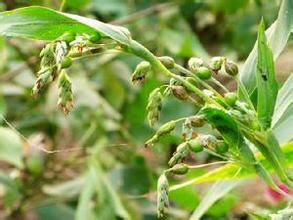
Job’s Tears from the south are large, and Ma Yuan intended to use them as seeds, loading them onto a cart to bring back. At that time, people regarded them as a rare treasure from the south, and the nobility coveted them. Unfortunately, a treacherous minister reported to the emperor that Ma Yuan had hoarded several carts of southern pearls for personal gain. The emperor was initially skeptical, but after Ma Yuan fell ill and died during a military campaign, the slanderous minister seized the opportunity to accuse the general of neglecting military affairs and brought up the issue of corruption in Jiaozhi. Emperor Guangwu was furious, stripped Ma Yuan of his titles, and when the remains of the famous general were returned to his hometown, historical records noted that no one mourned him. Later, when Ma Yuan’s descendants came to court to plead for justice, the truth was revealed, and he was posthumously honored as the Marquis of Xinxu. This incident became known as the “Slander of Job’s Tears,” “Fubo’s Job’s Tears,” or “Job’s Tears Pearl,” symbolizing being wronged and slandered.
Job’s Tears are produced in the southern provinces, yet they are said to be affected by miasma. A skilled general, Job’s Tears gained a reputation. If not for the thirsty steed leaving its tracks, who would recognize the general’s true integrity? This issue I am introducing to you is — Job’s Tears.
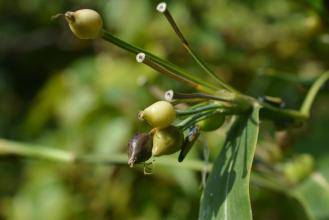
The eight ancient surnames are Jiang, Ji, Gui, Si, Ying, Ji, Yao, and Yun, which are the direct descendants of the Yellow Emperor, with a history spanning nearly 5000 years. All Chinese people claim to be descendants of Yan and Huang. In the process of the Chinese nation’s reproduction and development, the Yellow Emperor is the common ancestor of the Chinese nation. However, the descendants of the Yellow Emperor are numerous, and during the long feudal society, they were distributed across various regions, mostly taking place names as their surnames. The “Wuyue Spring and Autumn” records that the son of Emperor Zhuangxu, Gun, took a daughter of the Youxin clan named Nüxi, who was young and not yet pregnant. Later, she consumed Job’s Tears and became pregnant, giving birth to Da Yu, hence the surname Si. Without Job’s Tears, how could there be King Yu? Without Da Yu, the land of China would likely still be flooded today. During the changes of ancient dynasties, kings claimed divine right to rule to validate their authority. It is astonishing that such a small grain could determine a nation’s ruler and surname, which seems to be fate.
Job’s Tears, also known as Yìyǐrén or Liùgǔzǐ, is listed as “the supreme medicine” in the “Shennong Bencao Jing”. It is said to have a “sweet taste, slightly cold, and is effective for wind-dampness, relieving qi, and removing evil qi from the muscles and bones. Long-term use lightens the body and boosts energy.” This has been recorded in many TCM texts. As one of the oldest species on Chinese soil, our ancestors first recognized Job’s Tears as a food source. In the Song Dynasty, Lu You wrote a poem about Job’s Tears, indicating its significance: “Initially visiting Tang’an, I cooked Job’s Tears, which did not lose its beauty when cooked. As large as lotus seeds and white as jade, smooth and fragrant, filling the house with aroma. The rich belly and neck do not enter the plate, let alone the cheese and sour cream. Returning east, I think it is hard to find, always asking people who do not recognize it. Alas, this rare material has been abandoned since ancient times; you should try to seek it among the hedges!” This shows that ancient people regarded Job’s Tears as a staple food.
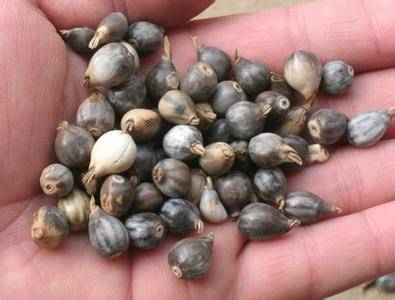
Around the sixteenth century, Job’s Tears were spread from the Central Plains to South Asia and Europe by Western missionaries. In North America, the shape of Job’s Tears mutated, resembling human tears, and thus it was named “Job’s Tears” or “Saint Mary’s Tears,” elevating it to a sacred status. Today, Job’s Tears are no longer a staple food worldwide, but in Southeast Asia, women still regard it as a daily food for beauty. Job’s Tears are a treasure with no waste, earning the title of “King of Gramineae” due to its high nutritional and medicinal value. Among grains, Job’s Tears are high in fiber, low in fat, and low in calories, making them one of the best staple foods for weight loss. The “Bencao Gangmu” records that Job’s Tears can strengthen the spleen and benefit the stomach, nourish the lungs, and clear heat. Clinical evidence shows that Job’s Tears can induce ovulation, and due to its high nutritional and medicinal value, it is also known as “the world’s best rice.”
Job’s Tears harmonize with the spleen, which stores the spirit, thus it is effective for spleen dysfunction, which can harm the muscles. If one wishes to stretch and bend, but cannot, and if the earth fails to retain and obstructs the wind that one cannot withstand, it attracts dampness that combines to form obstruction. Long-term use can remove dampness, thus stabilizing the spleen and stomach; when the spleen and stomach are stable, the middle burner is treated; when the middle burner is treated, it can nourish the four limbs and promote blood circulation. Its shape resembles rice, hence the common name rice kernel. Its leaves resemble those of the leizhi plant and are scattered, also resembling the seedlings of millet, hence the names Jie Lei and Qishi. The hard variety is known as Ganmi, which implies strength. The “Jiu Huang Bencao” states: “The Hui rice is also called Western Shuzhu, commonly known as grass beads.”
Job’s Tears grow in spring, with stems reaching three to four feet high, leaves resembling millet leaves, blooming red and white flowers, forming spikes, and bearing greenish-white seeds in May and June, shaped like beads and slightly elongated, hence the name Job’s Tears. Children often string the beads for play.
This product is the dried mature seeds of the plant Job’s Tears. The plants are harvested in autumn when the fruits are ripe, dried, and the fruits are threshed, then dried again, removing the outer shell, yellow-brown seed coat, and impurities to collect the seeds.
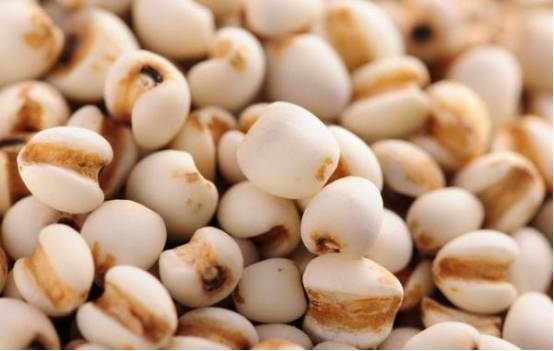
Job’s Tears thrive in dry air and are nourished by the autumn air, thus they have a sweet, bland taste, are slightly cold and non-toxic, and have a slightly descending nature that can remove dampness and promote urination. Job’s Tears belong to the category of grains, growing in summer and maturing in autumn, with a sweet taste and white color, and a slightly cold nature, embodying the essence of Yangming metal and earth. They are effective for muscle spasms and contractions, which cannot bend or stretch; Yangming moistens the muscles, and the muscles bind the bones and facilitate movement. When the muscles are moistened, all muscles harmonize. Due to their ability to remove dampness, they can benefit the joints, eliminate athlete’s foot, treat weakness and spasms from dampness, reduce edema and pain, promote urination for heat dysuria, and kill roundworms. Due to their slightly descending nature, they also treat cough with phlegm, benefit the stomach, and due to their cooling nature, they can clear heat, alleviate thirst, and relieve shortness of breath. Job’s Tears are best at promoting urination without depleting true yin energy; for those with excess dampness in the lower body, they are most suitable. Depending on the severity of the illness, the dosage can be adjusted, ensuring that yin and yang are not harmed, and dampness can be easily eliminated. Therefore, for any water-damp conditions, use Job’s Tears as the main ingredient, supplemented with herbs that strengthen the spleen and eliminate dampness, such as Ma Huang and Xing Ren for wind-dampness, or Yu Li Ren for edema and shortness of breath. There has never been a case where it did not work quickly. Job’s Tears have a very mild effect; why not use Zhu Ling and Ze Xie, which can be used in smaller amounts? It is not known that diuretic herbs must consume energy; Job’s Tears are unique in promoting urination without depleting true energy, hence they can be used in larger quantities.
Job’s Tears remove dampness but are not as effective as the two methods of assisting dryness; they clear heat but are not as effective as Qín and Lián in depleting yin; they benefit qi but are not as effective as Shēn and Zhú in nourishing damp heat, making them a crucial herb for benefiting middle qi. Ancestors viewed Job’s Tears as a medicine for supplementing the middle earth, hence they called it a gentle and moderate herb, yet its effects in the middle are rapid; how can it be gentle?
Job’s Tears have high nutritional value, praised as the “King of Gramineae,” rich in fats, various amino acids, and trace elements, making it an excellent and affordable nutritional product for patients with chronic illnesses and those recovering from illness. Job’s Tears have anti-cancer effects due to the presence of Job’s Tears ester, which can assist in the treatment of gastric cancer and cervical cancer. The anti-cancer properties of Job’s Tears are also reflected in their rich selenium content, which inhibits the proliferation of cancer cells. For those already harboring cancer cells, consuming more Job’s Tears can assist in cancer treatment, while healthy individuals can reduce the incidence of tumors by consuming Job’s Tears. Currently, both domestically and internationally, Job’s Tears are commonly used in porridge as an auxiliary treatment for gastric cancer, colorectal cancer, and cervical cancer. Indeed: Job’s Tears surpass Lingzhi grass, with high medicinal and nutritional value, regular consumption can prolong life and rejuvenate.
I have noted the following prescriptions (which I have not personally used) for reference:
1. 25 grams of Job’s Tears and 100 grams of wild water chestnuts (split with shells), decocted into a concentrated juice, taken twice a day for one month as a course of treatment, can prevent and treat gastric cancer and cervical cancer.
2. 20 grams each of Job’s Tears and red beans, cooked into porridge, used to prevent and treat bladder cancer.
3. 500 grams of Job’s Tears and 150 grams of Sanqi, ground into fine powder, taken orally three times a day, 5 grams each time, with hot water, used to prevent and treat uterine tumors and fibroids.
4. 20 grams each of Job’s Tears, water chestnuts, and Haritaki, decocted in water, one dose per day, for a course of 1-2 months, can prevent and treat gastric cancer, esophageal cancer, rectal cancer, and bladder cancer.
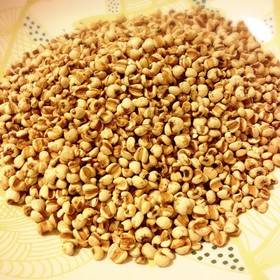
Medicinal Job’s Tears come in two forms: raw Job’s Tears and roasted Job’s Tears. Raw is suitable for clearing heat and promoting urination, while roasted is suitable for strengthening the spleen and stopping diarrhea. Raw Job’s Tears are slightly cold, best for promoting urination and removing dampness, effectively treating conditions such as difficulty urinating, edema, wind-damp pain, gout, and phlegm-heat cough. However, those with spleen and stomach deficiency and cold should use roasted Job’s Tears. Roasted Job’s Tears are prepared by gently roasting Job’s Tears until slightly yellow with a few charred spots, fragrant, and puffed. After roasting, the medicinal properties of Job’s Tears become more balanced, and compared to raw Job’s Tears, they are better for strengthening the spleen and stopping diarrhea, making them an excellent remedy for spleen deficiency with excessive dampness and diarrhea. Roasted Job’s Tears have a more pronounced effect on strengthening the spleen than simply roasted Job’s Tears.
In the Southern Song Dynasty, Zhang Shinan recorded that the famous poet Xin Qiji suffered from a disease known today as small intestine qi, which caused heavy drops like a cup. A Daoist taught him to take Job’s Tears leaves and Job’s Tears beads, boil them into a paste, and take it, which soon resolved the issue. Later, the famous doctor Cheng Jing also suffered from this disease, and Xin personally taught him this remedy, which cured him immediately. The famous Tang physician Chen Zangqi wrote in the “Bencao Shiyi” that Job’s Tears can treat thirst, which is now known as diabetes. Sima Xiangru suffered from thirst and was cured by Job’s Tears. This is evident in the poem: “I am ashamed not to have Sima’s talent, I accidentally suffer from Sima’s thirst. The water has an elder, and Job’s Tears are clustered. For drinking, it can support the frail, and I am fortunate to live on.” Who knows the evil ones do not wish to change the wild yam?
Wind, cold, and dampness combine to form obstruction. Job’s Tears are dry and can remove dampness; their sweet taste can enter the spleen and nourish it, while their bland nature can promote drainage. Thus, they are effective for muscle spasms and contractions that cannot bend or stretch, and for wind-damp obstruction, they eliminate evil qi from the muscles, benefit the intestines and stomach, reduce edema, and promote appetite. Long-term use lightens the body. In summary, when dampness is removed, the spleen and stomach are stabilized; when the spleen and stomach are stable, the middle burner is treated; when the middle burner is treated, it can nourish the four limbs and promote blood circulation. The sweet taste benefits the spleen, while the dryness removes dampness; when the spleen is strong, swelling diminishes, and when the spleen is strong, appetite improves. When dampness is removed, the body feels light, and thus the above ailments can heal themselves without seeking treatment. Job’s Tears are the key medicine for removing dampness, applicable in both cold and heat conditions.
Job’s Tears are an excellent remedy for skin diseases, particularly warts. Professor Yue Meizhong has stated: “For treating warts, Job’s Tears have a good effect. Grind it into powder and take 10 grams daily, or decoct 30 grams, generally falling off within a month.” Job’s Tears also have sun protection and whitening effects; their extracts have good absorption capabilities against ultraviolet rays. When used externally, Job’s Tears inner fat can accelerate blood circulation in the skin, inhibit melanin formation, and gently condition the skin. Used in creams, they have sun protection effects and are effective against acne, inflammatory, and rough skin.
Those with spleen deficiency without dampness, little sweating, dry stools, and pregnant women should be cautious. Job’s Tears are slightly cold, so patients with spleen and stomach deficiency, those with cold syndromes, pregnant women, and those with weak constitutions who often experience dry lips and thirst should not consume Job’s Tears porridge long-term. However, they can choose appropriate herbs based on TCM principles of “removing the nature and using it”. For example, when eating Job’s Tears porridge, adding a little ginger can counteract the cold nature of Job’s Tears.
Job’s Tears are widely distributed across most regions of the country, mostly cultivated, often found near houses, in wilderness, by rivers, streams, or in damp valleys. Most regions in China produce them, with major production areas in Fujian, Hebei, Liaoning, and Jiangsu. The Job’s Tears from Pucheng in Fujian are known as Pucheng Job’s Tears, those from Anping in Hebei are known as Qiji Job’s Tears, and those from Liaoning are known as Guany Job’s Tears, all of which are authentic medicinal materials.
The medicinal Job’s Tears are round or oval-shaped, with a blunt round top, white or yellowish-white on the surface, smooth or with indistinct longitudinal stripes, sometimes retaining a yellow-brown outer skin, with one deep and wide longitudinal groove on the side. They are hard, and when broken, the inside is white and powdery.
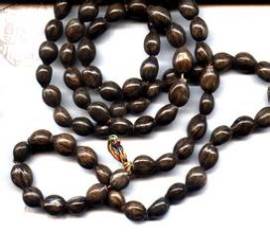
In modern botany, “Job’s Tears” and “Job’s Rice” are two different plant species. Job’s Tears have two types: one is sticky and thin-shelled, which is Job’s Tears. Its grains are white like glutinous rice, suitable for porridge and rice dishes, and can also be used to brew wine. The other is round and has a thick, hard shell, which is the Bodhi seed. Its grains are few, but they can be strung into prayer beads, hence they are also called prayer beads. The commonly seen counterfeit of medicinal Job’s Tears is the large Job’s Rice, also known as grass beads. Before coming to Qingdao, the identification method I knew was to see if Job’s Rice is taller than it is wide; if it is taller, it is Job’s Rice, while if it is wider than it is tall, it is grass beads. Here, the experienced masters say that shape is just one method, but not the most important. Job’s Tears are generally taller than they are wide, but those that are wider than they are tall are not necessarily counterfeit. The main identification points for Job’s Tears are: first, they should have a sticky texture and feel slightly sticky to the teeth; other counterfeits like grass beads do not have this quality. Second, good Job’s Tears are white and slightly green; poor Job’s Tears are overly white, which usually indicates they have been sulfur-treated. Third, when squeezed, if they crumble easily, they are poor quality and have been soaked in water. Additionally, if stored for a long time and improperly, they may develop a rancid smell. A rancid smell indicates that the fats have oxidized and deteriorated, which can harm health. In severe cases, they may mold and produce aflatoxins, which are highly toxic and carcinogenic. Job’s Tears that have insects are generally not harmful to health but have reduced efficacy.
Job’s Tears are rich in starch and protein and are not resistant to storage. Under room temperature conditions, prolonged storage in plastic bags will lead to significant insect damage, accompanied by deepening color and rancid smell. Therefore, Job’s Tears must be stored with strict control of moisture content and kept sealed in a cool place. Job’s Rice is not afraid of freezing; when placed in the freezer or refrigerator, its quality will not change significantly, but it must be sealed.
Job’s Tears are small, green, sweet, and sticky when bitten, making them excellent.
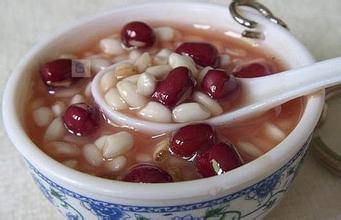
Most of the Job’s Tears products here come from Guizhou Province. Due to the variability in quality of medicinal materials purchased by the company each time, Guizhou Job’s Tears can sometimes be wide oval-shaped or long oval-shaped. Although they are all produced in Guizhou, the varieties are not the same. Judging the origin based on appearance is not scientific. According to relevant experiments, Job’s Tears from Guizhou have the highest protein content and the lowest ash content, while Liaoning has the highest fat content. Other experiments have shown that selenium content is highest in Jiangxi and Guangxi, while Hunan and Fujian have the lowest. This shows that the quality of Job’s Tears varies due to the local soil and water conditions.

Long press the image above for 3 seconds to scan the QR code to follow
If you like it, please give it a thumbs up!↙

